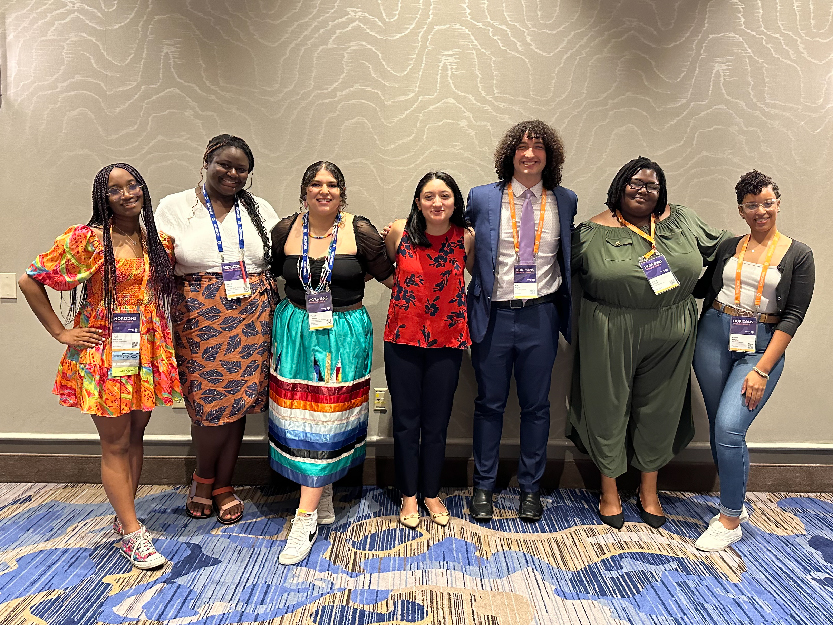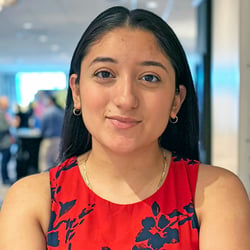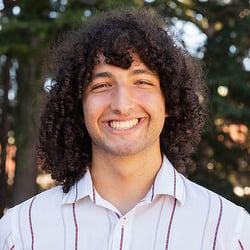3 min read
Find Your Passion, Trust Young Talent, and More Lessons From Gen Z
![]() Alex Edgar and Dayanara Rocha-Castillo
:
June 27, 2023
Alex Edgar and Dayanara Rocha-Castillo
:
June 27, 2023

This year, Jobs for the Future’s Horizons summit welcomed eight Horizons Ambassadors—young people navigating the path from high school to postsecondary learning and careers. Here are reflections from two of the Ambassadors: Dayanara Rocha-Castillo, a student at Brigham Young University, and Alex Edgar, a student at the University of California, Berkeley.
 Dayanara Rocha-Castillo
Dayanara Rocha-Castillo
Why should limits imposed by our society and systems hinder our ability to grow, our commitment to succeed, and our yearning for happiness and prosperity?
This year’s Horizons summit has been a wake-up call. A call to action. We can’t let societal barriers stop us from knowing our potential as individuals and the strength we hold when we are a united force. As we come together from all different backgrounds, communities, and starting lines, we all can see eye to eye that something has to change.
We have been hypnotized by the illusion that a four-year college degree is a one-size-fits-all recipe for success. However, that is not the case. Horizons speakers from a range of experiences, from corporate America to local workforce development organizations, all agreed that we need to re-evaluate the “qualifications” of a job.
We’re coming into a time when skills-based hiring is becoming a necessity. More and more alternative paths to success have been identified and sometimes can be just as effective or even better than college. We have to stop underestimating and undervaluing people who take alternative routes. Success is no longer a cookie-cutter formula.
I was fortunate to speak with Joshua Johnson, director of JFF’s National Innovation Hub for Diversity, Equity, Inclusion, and Accessibility in Registered Apprenticeship. He gave me three pieces of advice that I knew could help young adults starting their careers and those looking to make an impact.
- Find what you’re passionate about. When we have a genuine interest, no matter where we come from or what we lack, people will notice that. People will see that despite our “limitations,” our voices are heard. Nine out of ten times, it’s not what we know, it’s who we know that will help us go further in our careers and industries.
- Research what careers or jobs are related to your current one. Many times, the skills that you acquire over the years from one place or another will support you in other positions. It helps you to be flexible about your next career move.
- Don’t be afraid to course-correct. We don’t have all the answers now, nor will we have them 20 years from now. But when we are open to exploring new options and stepping into the unknown, we get to broaden our own horizons. And at times, we get to touch more people’s lives than we ever thought we could.
This world is limitless, but we are often the ones who set limits in the first place. I’ve realized we can never put these limits on ourselves because that’s when we close avenues that we didn’t even know were open.
“As we come together from all different backgrounds, communities, and starting lines, we can all see eye to eye that something has to change.”
— Horizons Ambassador Dayanara Rocha-Castillo
Alex Edgar
I arrived at Horizons much like the rest of you. I was excited to engage with thought-provoking panels, connect with new friends and mentors, and explore the incredible city of New Orleans. Yet one key difference existed between me and the majority of my fellow attendees: I’m a college student.
Shocking, right? I guess at some point in the past, the powers that be decided that the terms “expert” and “practitioner” could only apply to those influencing systems, not those who exist within them. But at Horizons, students and early talent were treated as the wealth of firsthand knowledge that we are. I am so grateful for this experience, which changed my perspective and understanding of our education and workforce systems.
At Horizons, the discussions flipped the norms and techniques we’ve grown accustomed to, and forced all of us to reassess the internal and systemic factors that present barriers for ourselves and others trying to increase equity and access for all. Beyond the equity framework, the Horizons theme “without limits” teaches us that every individual is a learner, educator, and practitioner all in one, and that only by embracing the intersectionality of those three roles can we access our limitless potential and uplift our communities in the process.
Horizons was an incredible experience and gave me the opportunity to reflect on my own advice for all stakeholders who want to better engage Gen Z in efforts to improve our education and workforce systems.
- If you see a new or young face, make the first move and introduce yourself! JFF President and CEO Maria Flynn did exactly that to me at a conference a year ago, and look at me now. You never know how a simple conversation can make a difference in a young person’s life.
- Invite more young people into your conversations and spaces like Horizons. The more youth voices are involved in the ideation process, the more likely it is that young people will actually respond and engage with the work.
- My generation is great at social media, but trust early talent with more than just social media roles! Our skill sets and knowledge are often much broader than many entry-level positions give us credit for.
I look forward to seeing how the conversations we had at Horizons can propel us toward a society where all people can live without limits.
“The more youth voices are involved in the ideation process, the more likely it is that young people will actually respond and engage with the work.”
— Horizons Ambassador Alex Edgar
Thank you to our sponsors at LinkedIn, College Board and Salesforce for their individual support of the Horizons Ambassador. These sponsors provided resources that allowed the opportunity for early talent to attend Horizons, engage in programming and learn from mentors across the country.



